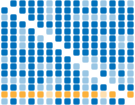The page of Jaroš, Peter, English biography
Biography
Born 22 January 1940 in Hybe, in the Liptov region. From 1957 to 1962 he studied Slovak and Russian at Comenius University in Bratislava. Between 1962 and 1965 he was an editor of the weekly Kultúrny život, then, until 1971, he worked for Slovak Radio in Bratislava. From 1972 he wrote film scripts for Slovak films. From 1992 to 1994 he was a deputy in the Slovak parliament. From 1996 to 1999 he worked in the National Centre for Slovak Literature, and later in the National Centre for Edification in Bratislava.Peter Jaroš belongs to the generation that began to write at the beginning of the Seventies. His work is characterized by constant experimentation. He does not recognize any prior aesthetic norms or limiting rules of literary work. He is a restless and free creative spirit without regard to criticism, politics, or traditional literary techniques. That is why each of his works provokes the controversial reaction of critics who, despite their reservations, clearly emphasize the extraordinary talent of the writer.
His literary work balances on the borderline of human tragedy and comedy, up to the grotesque, even in the serious and extreme situations. He frequents the suggestive and imaginary, technical virtuosity, eruptiveness, special dynamics and atmosphere. His work emanates from the manifold character of the world and the deep penetration of life’s situations, the wealth of stylistic devices and the cultivated following of aesthetic objectives. Characteristic features of his work are lyricism, eroticism, absurdity, naturalized cynicism and biologism, but also deep sensitivity with shocking solutions and truths about people. He plays with the variegated forms of human dimensions using unconventional devices and philosophical background. He expresses the feelings of contemporary man with his joys, and happiness together with evil and the loneliness of modern civilization with its many problems.
In his work he passed through several stages of development. In his first five works of 1963 - 1967 he used psychological devices in combination with the literature of "everyday life". Other works show the influence of the "nouveau roman". His most successful novel is the Millennial Bee, adapted for a film honoured at the Venice Film Festival in 1983. Literary critics welcomed it as one of the most successful post-war novels.




